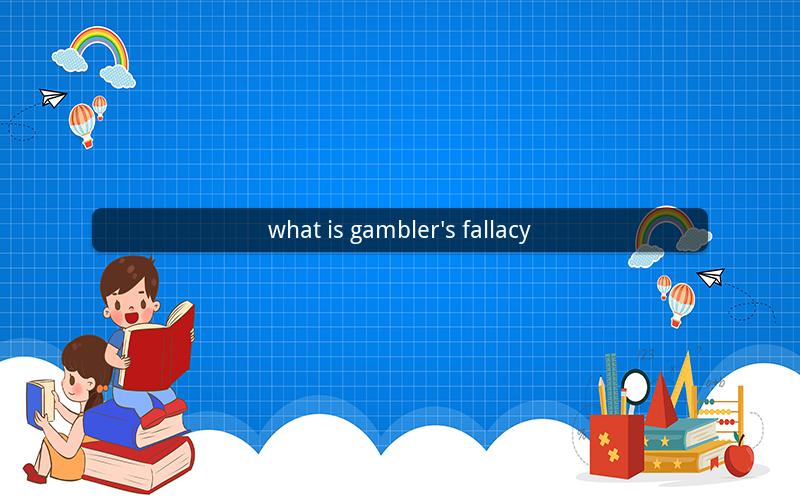
What is Gambler's Fallacy?
Table of Contents
1. Introduction to Gambler's Fallacy
2. Understanding Probability
3. Common Misconceptions About Probability
4. Real-Life Examples of Gambler's Fallacy
5. The Role of Psychological Factors
6. How Gambler's Fallacy Impacts Decision Making
7. Preventing the Gambler's Fallacy
8. Conclusion
1. Introduction to Gambler's Fallacy
The concept of gambler's fallacy, also known as the Monte Carlo fallacy, is a cognitive bias that leads individuals to believe that a random event is more or less likely to occur based on previous outcomes. This fallacy is particularly prevalent in gambling scenarios, where players often believe that a sequence of outcomes has increased or decreased the likelihood of a particular outcome in the future.
2. Understanding Probability
To grasp the essence of the gambler's fallacy, it is crucial to have a solid understanding of probability. Probability is the measure of the likelihood of an event occurring. It is expressed as a number between 0 and 1, where 0 indicates an impossible event and 1 indicates a certain event.
3. Common Misconceptions About Probability
Several misconceptions about probability contribute to the gambler's fallacy. One of the most common is the belief that if an event has not occurred recently, it is more likely to occur in the future. This misconception is based on the idea that random events are influenced by previous outcomes, which is not the case.
4. Real-Life Examples of Gambler's Fallacy
The gambler's fallacy has been observed in various real-life scenarios. For example, in a game of roulette, if a particular color has come up multiple times in a row, some players might believe that the opposite color is more likely to appear next. Similarly, in a coin toss, if the coin has landed on heads several times consecutively, some players might think that tails is more likely to come up next.
5. The Role of Psychological Factors
Psychological factors play a significant role in the occurrence of the gambler's fallacy. The human brain is wired to seek patterns and make predictions, which can lead to the erroneous belief that random events are influenced by previous outcomes.
6. How Gambler's Fallacy Impacts Decision Making
The gambler's fallacy can have detrimental effects on decision making. For instance, investors might make irrational trading decisions based on the belief that a stock is due for a price increase after a series of losses. This can lead to significant financial losses and suboptimal investment strategies.
7. Preventing the Gambler's Fallacy
To prevent the gambler's fallacy, it is essential to understand that random events are independent of each other. Here are some strategies to overcome this cognitive bias:
- Educate Yourself: Learn about probability and understand that random events are not influenced by previous outcomes.
- Stay Objective: Avoid making decisions based on emotions or past experiences.
- Use Statistics: Employ statistical tools to make informed decisions.
- Seek Professional Advice: Consult with experts to gain a better understanding of the situation.
8. Conclusion
The gambler's fallacy is a common cognitive bias that can lead to erroneous beliefs and poor decision making. By understanding the nature of probability and the factors that contribute to this fallacy, individuals can make more informed choices and avoid the pitfalls of this cognitive bias.
---
Questions and Answers
1. Q: What is the difference between probability and chance?
A: Probability is a measure of the likelihood of an event occurring, while chance refers to the uncertainty of an event's outcome.
2. Q: Can the gambler's fallacy occur in everyday life, not just in gambling?
A: Yes, the gambler's fallacy can manifest in various aspects of life, such as investing, sports betting, and even casual observations.
3. Q: How can one avoid making decisions based on the gambler's fallacy?
A: By understanding the nature of probability, staying objective, using statistics, and seeking professional advice, one can minimize the impact of the gambler's fallacy on decision making.
4. Q: What is the role of cognitive biases in the occurrence of the gambler's fallacy?
A: Cognitive biases, such as the tendency to seek patterns and make predictions, contribute to the occurrence of the gambler's fallacy.
5. Q: Can the gambler's fallacy be beneficial in certain situations?
A: While the gambler's fallacy is generally detrimental, it can sometimes lead to creative problem-solving and innovative approaches to challenges.
6. Q: How can one recognize when the gambler's fallacy is at play?
A: Recognizing the gambler's fallacy involves identifying situations where the belief that random events are influenced by previous outcomes is evident.
7. Q: Is the gambler's fallacy more common in certain cultures or societies?
A: The gambler's fallacy is a universal cognitive bias that is likely to be present in all cultures and societies.
8. Q: How does the gambler's fallacy relate to the concept of regression to the mean?
A: Regression to the mean is a related concept that suggests extreme outcomes will tend to move closer to the average over time, which can also contribute to the gambler's fallacy.
9. Q: Can the gambler's fallacy be used to predict future events?
A: No, the gambler's fallacy cannot be used to predict future events accurately, as it is based on the erroneous belief that random events are influenced by previous outcomes.
10. Q: How can educators help students understand and avoid the gambler's fallacy?
A: Educators can help students understand the gambler's fallacy by teaching probability, emphasizing the importance of critical thinking, and encouraging students to question assumptions.